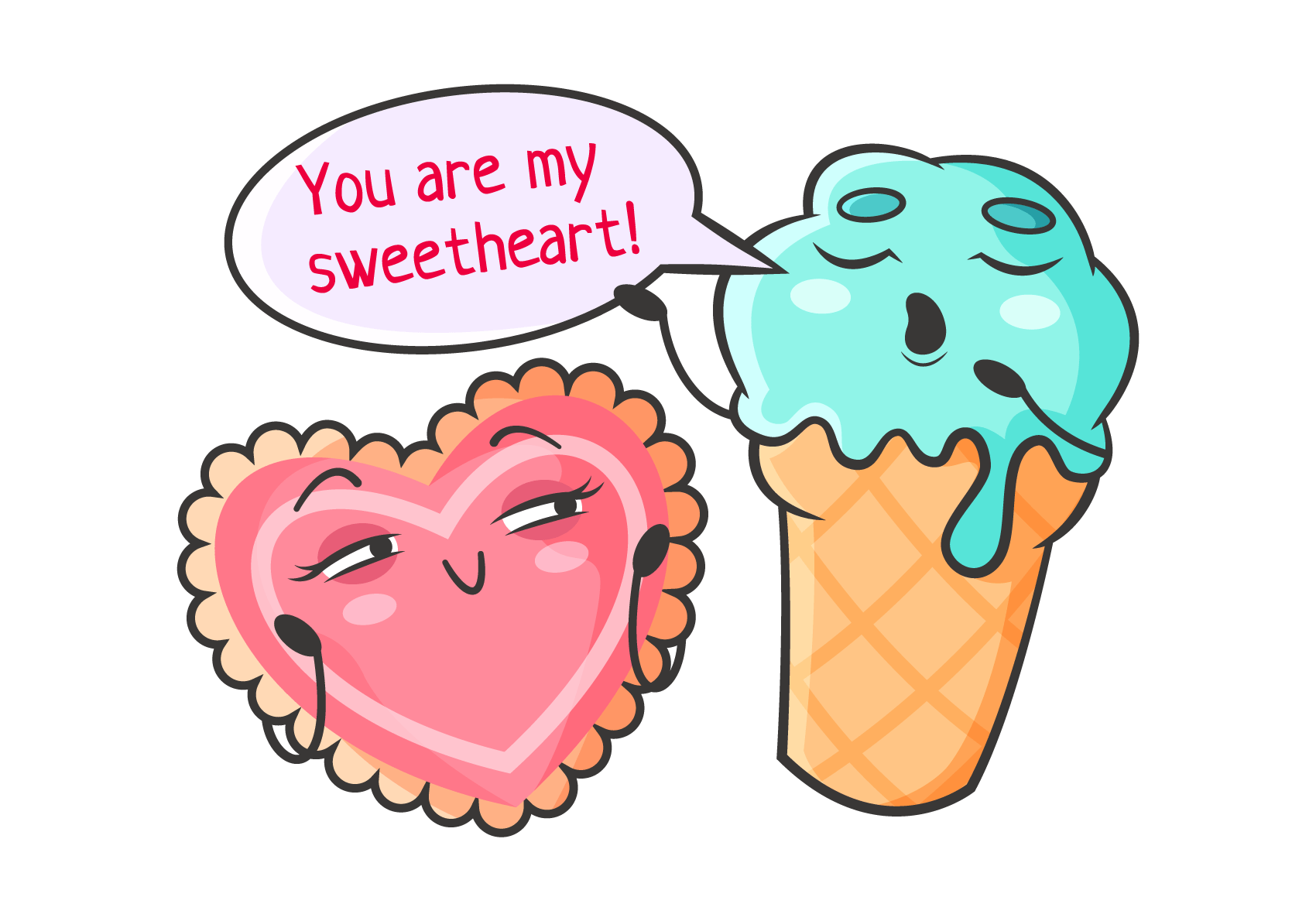Если заглянуть в словарь, вы узнаете, что «друг» по-английски — friend, а «знакомый» — acquaintance. Но это тот случай, когда словарь сообщает сухую информацию, не объясняя культурные тонкости. Возьмем американцев, при общении с ними, вы заметите, что довольно большой круг людей они называют friends, а вот слово acquaintance почти не используют. Складывается впечатление, что у американцев много друзей и мало знакомых. У нас же наоборот: знакомых много, а друзей мало. Это связано с тем, что американцы понимают эти слова не так, как мы.
Кого американцы называют друзьями (friends)?
Мы привыкли называть друзьями тех, кого знаем хорошо и давно, по-настоящему близких людей, а знакомыми — тех, кого знаем не очень хорошо. Приятель — где-то посередине. Словами «друг», «дружба» у нас пользуются аккуратно. У многих взрослых людей друзей немного, в отличие от знакомых и приятелей.
В английском же языке слово friend может подразумевать:
- Друг в нашем понимании, близкий человек, с которым «пуд соли съел».
- Приятель или знакомый (мы бы сказали «знакомый» в этом случае), человек, с которым вы немного общаетесь или общались, но, условно говоря, на День Рождения приглашать не станете.
Американец может познакомиться с кем-то на вечеринке, немного пообщаться, пропустить по стаканчику и тут же сказать, что это мой «friend». Мы в таком случае всегда скажем «знакомый». Но нужно понимать, что и американцы разделяют друзей и приятелей, знакомых (как мы понимаем эти слова), просто могут называть их одним словом. Говоря, что вот этот человек (с которым познакомились на вечеринке) — «my friend», американец подразумевает, разумеется, не «близкий друг», а «приятель, знакомый».
И это понятно всем: ему, знакомому, другому американцу, но может быть непонятно иностранцам (нам, например), не знающим об этой особенности. Мы подумаем: неужели американцы так легко становятся друзьями? Не настолько легко, просто под «friend» не всегда подразумевается «друг» в нашем понимании, вот и все.
Как называть знакомых по-английски?
Мы называем знакомыми и тех, кого едва знаем, и тех, кого видим часто (по работе, например), но до статуса друзей они не дотягивают. То есть довольно широкий круг людей. Знакомых (в нашем понимании) американцы называют либо тоже «friend» (но это, скорее, хороший знакомый, приятель), либо каким-нибудь обходным способом, выражением, например: «someone I know», «a guy/girl I know» и так далее. Например:
I don’t teach English now because of my new job, but there is a guy I know, he might be able to help you. — Я сейчас не преподаю английский из-за своей новой работы, но у меня есть знакомый (букв. «один парень, которого я знаю»), он может тебе помочь.
I haven’t worked in that company but I know some people who work there. — Я не работал в этой компании, но у меня есть там знакомые (букв.: но я знаю людей, которые там работают).
А вот словом «acquaintance» в английском пользуются не так часто. Называя кого-то «acquaintance», подразумевают, что это человек, с которым можно разве что поздороваться, то есть этот человек им не близок и необязательно симпатичен, подчеркивают, что это НЕ друг, а ТОЛЬКО знакомый.
— Is he your friend? — Он твой друг?
— No, just an acquaintance. — Нет, просто знакомый.
«Acquaintance» — это холодное слово, которое отчетливо дистанцирует от упоминаемого человека. Так говорят о ком-то в третьем лице и не в его присутствии.
Одна из «странностей», которые носители английского языка подмечают за Russian speakers — это то, что мы часто используем слово «acquaintance». Для них это так же странно, как и для нас то, что американцы называют «friends» людей, с которыми не съели пуд соли. Вот так и получается, что «friends» у американцев много, а знакомых, вернее, людей, которых они называют «acquaintance», мало (не считают, а именно называют).
Здравствуйте! Меня зовут Сергей Ним, я автор этого сайта, а также книг, курсов, видеоуроков по английскому языку.
Подпишитесь на мой Телеграм-канал, чтобы узнавать о новых видео, материалах по английскому языку.
У меня также есть канал на YouTube, где я регулярно публикую свои видео.
The camaraderie between Russian men is widely praised, so it’s no wonder Russians have an array of words for ‘friend’, each of them carrying a slightly different meaning.
1. Брат (brat, ‘brother’)
Kira Lisitskaya (Photo: Alexey Kudenko/Sputnik; Legion Media)
Brother is, of course, much more than friend, so this is how Russian guys call each other if they’re really close and have been through some ordeals together. A diminutive братишка (‘brat-ishka’) is a more friendly variant and ‘bratan’ carries an air of respect and dignity. Also, Russians from the Caucasian region, who practice Islam, consider all fellow Muslim believers “brothers” and even slightly abuse this word, especially with strangers.
However, it’s not uncommon to be called ‘brat’ by a complete stranger on the street in Russia – but in most cases, the person may simply want something from you, like a cigarette or some spare change.
2. Друг (droog, ‘friend’)
The obvious word for a friend has also many derivatives in Russian – дружбан (‘droozhban’), дружище (‘droozhishche’), друган (‘droogan’). All of them just emphasize the meaning of ‘friend’. After брат, друг stands above all other words in terms of seriousness of friendship.
Again, if a stranger wants something from you on the street, they might address you as ‘droog’, trying to imply they mean no harm.
3. Кореш (‘koresh’)
This word came from criminal circles in the early 20th century. In Yiddish, ‘korev’ means ‘relative’. Since the Russian criminal world had many Jewish people speaking Yiddish, their words migrated into Russian. Currently, the word ‘koresh’ just means “a close friend” and doesn’t really carry any criminal meaning.
4. Земляк (zemlyak, ‘homie’)
A clean analogue of ‘homeboy’, земляк (“the one from the same land”) is used to mean that somebody is from the same place as you are, where земля means ‘land’ in Russian. In a vast country, people who go to work and live in Moscow or St. Petersburg from other cities and towns of Russia often end up making friends with people who come from the same regions, often referring to them as ‘zemlyak’, or with a touching diminutive – ‘zemelya’.
5. Старик (starik, ‘old man’)
Used in reference to boys only, ‘starik’ means someone you’ve known for a long time. It is also used ironically, when an older person addresses the younger one, who obviously can’t be an “old man”. However, referring to a girl or a woman as ‘starukha’ (‘old hag’) is an insult, even between girls.
6. Кент (kent, ‘buddy’)
Kira Lisitskaya (Photo: Dmitry Feoktistov/TASS; Legion Media)
Just like ‘koresh’, ‘kent’ probably came from Yiddish, where it means “the one who knows [you]”. This word is also borrowed from the language of criminals and is still used there. Normally, if a Russian guy calls someone ‘kent’, he implies that the friendship is really close and that he and his ‘kent’ overcame some tough times together.
7. Кирюха (kiryukha, ‘a drinking bud’)
Derived from the slang term кирять (kiryat, ‘to drink’), this word means a drink lover and also a buddy who you’re drinking with.
8. Приятель (priyatel, ‘pal’)
You wouldn’t want to call your friend a ‘priyatel’, because it really means a person you have just an easy relationship with, but it can’t be called friendship – yet. ‘Priyatels’ can become friends, but they don’t always do.
9. Товарищ (tovarisch, ‘comrade’)
Kira Lisitskaya (Photo: Isaak Dynin/TASS; Sergey Mamontov/Sputnik)
Derived from the word ‘tovar’ (‘product’), ‘tovarisch’ was initially used in Russia to mean a business partner. But, in the Soviet times, it became a widespread address form for the people in the USSR – and not only men; a woman could also be called a ‘tovarisch’. Currently, this word is used less often and it can be compared to ‘priyatel’ in terms of usage. We also have a separate article for this word.
10. Знакомый (znakomyi, ‘acquaintance’)
This word is the “least friendly” of them all and it’s used to mean a person you know of, but aren’t friends or pals with; you just happen to have their acquaintance and don’t necessarily have good relations with the person.
If using any of Russia Beyond’s content, partly or in full, always provide an active hyperlink to the original material.
Get the week’s best stories straight to your inbox
Расскажем о разнице между английскими словами со значением «друг», «приятель» и «знакомый».
Как на английском обратиться к другу или знакомому: a friend, an acquaintance, a companion, a mate, a buddy, a chap, a fellow или a pal? Сегодня разберем тонкости значений каждого из этих слов и приведем примеры их употребления в речи.
1. A friend
Основное значение слова a friend — «друг».
He’s a family friend. — Он друг семьи.
Другое значение этого существительного — «человек, которому можно доверять».
You can trust us, you’re among friends now. — Нам можно доверять, ты среди друзей.
Также словом a friend называют мецената — человека, который финансово поддерживает благотворительные фонды, социальные организации, деятелей искусства.
The friends of the Royal Academy raised money for the exhibition. — Меценаты Королевской академии собрали деньги для выставки.
В неформальном английском a friend может выступать не только существительным, но и глаголом. To friend означает «добавить в друзья в социальной сети».
I friended her and sent her a message. — Я добавил ее в друзья и отправил ей сообщение.
Приведем несколько распространенных словосочетаний и фраз со словом a friend.
| Словосочетание/Фраза | Перевод |
|---|---|
| a childhood friend | друг детства |
| a close friend | близкий друг |
| a lifelong friend | друг на всю жизнь |
| a trusted friend | верный друг |
| a circle of friends | круг друзей |
| to be in the friend zone | быть во френдзоне |
| to become friends | становиться друзьями |
| to have friends in high places | иметь высокопоставленных друзей |
| to make friends with | подружиться |
| to remain friends | оставаться друзьями |
| A friend in need is a friend indeed. | Друзья познаются в беде. |
| What are friends for? | На что еще нужны друзья? |
| With friends like you, who needs enemies? | С такими друзьями враги не нужны. |
2. A mate
Существительное a mate в значении «друг», «товарищ» используется только в неформальной беседе.
She’s my best mate. — Она моя лучшая подруга.
I’m meeting my mates at seven. — Я встречаюсь со своими товарищами в семь.
В формальной речи a mate употребляется в значении «помощник квалифицированного рабочего».
He was a carpenter’s mate. — Он был помощником плотника.
Изучите подборку словосочетаний со словом a mate.
| Словосочетание | Перевод |
|---|---|
| a chief mate | старший помощник |
| a classmate | одноклассник |
| a mate for life | спутник жизни |
| a room mate | сосед по комнате |
| a soul mate | родственная душа |
| a sparring mate | спарринг-партнер (в спорте) |
| an age mate | ровесник |
3. A pal
Слово a pal — еще один вариант неформального обращения к другу.
It’s my old pal John! — Это мой старый друг Джон!
A pal также используют в обращении к мужчине, который вас раздражает.
Hey, pal, put my things back or I’ll call the police. — Эй, приятель, положи мои вещи обратно, или я позвоню в полицию.
Слово a pal может быть частью фразового глагола: to pal up — заводить друзей, to pal around — проводить время вместе.
Who does Tom pal around with? — С кем Том обычно проводит время?
Nancy palled up with Tom while travelling round South America. — Нэнси подружилась с Томом во время путешествия по Южной Америке.
4. A buddy
Слово a buddy — это еще один неформальный способ обратиться к другу, с которым вы связаны общим делом.
At the university he was my study buddy. — В университете он был моим партнером по учебе.
Также словом a buddy, как и a pal, обращаются к мужчине, который вызывает у вас раздражение. И в то же время a buddy используют взрослые, доброжелательно общаясь с мальчиком.
Buddy, you are very rude! — Приятель, ты очень груб.
Is everything all right, buddy? — Все в порядке, приятель?
Приведем распространенные словосочетания со словом a buddy.
| Словосочетание | Перевод |
|---|---|
| a bosom buddy | сердечный друг |
| a buddy-buddy | навязчивый приятель |
| a study buddy | партнер по учебе |
| a workout buddy | партнер по спорту |
| an old buddy | старый друг |
5. A chap
Слово a chap означает «мужчина», в русском языке его эквиваленты — старина, приятель, парень.
We have a lot in common, old chap. — У нас много общего, старина.
Приведем популярные словосочетания со словом a chap.
| Словосочетание | Перевод |
|---|---|
| a clever chap | умник |
| a funny little chap | чудак |
| an old chap | дружище, старина |
6. An acquaintance
В английском языке словом an acquaintance называют знакомого.
She is more of an acquaintance than a friend. — Она больше знакомая, чем подруга.
В таблице приведем несколько словосочетаний со словом an acquaintance.
| Словосочетание | Перевод |
|---|---|
| a casual acquaintance | случайный знакомый |
| a passing acquaintance | мимолетное знакомство |
| an intimate acquaintance | близкий знакомый |
| an old acquaintance | старый знакомый |
| to make smb’s acquaintance | познакомиться с кем-либо |
7. A companion
Существительное a companion употребляют в отношении человека, с которым вы часто проводите время. Словом a companion можно назвать партнера, приятеля и собеседника.
She is not just my wife, she is my friend, my companion. — Она не только моя жена, она мой друг, мой партнер.
Интересно, что когда-то словом a companion называли молодую женщину, которой в путешествии платили за заботу о пожилом или больном человеке, а теперь a companion относят к любому попутчику.
She went travelling with a female companion. — Она отправилась в путешествие с компаньонкой.
He said I was his best travel companion. — Он сказал, что я его лучший попутчик.
Запомните некоторые словосочетания со словом a companion.
| Словосочетание | Перевод |
|---|---|
| a close companion | близкий товарищ |
| a constant companion | постоянный спутник |
| a female companion | спутница, компаньонка |
| a personal companion | личный спутник |
| a travelling companion | попутчик |
8. A fellow
Слово a fellow означает «приятель», но чаще используется в обращении к коллегам.
His fellow workers refused to support him. — Коллеги отказались его поддерживать.
Еще a fellow — это член педагогического коллектива в колледже или университете.
He is a fellow of the University of Oxford. — Он член Оксфордского университета.
Также словом a fellow называют членов профессиональных объединений.
He is a fellow of the American Film Institute. — Он член Американской киноакадемии.
В таблице привели примеры словосочетаний со словом a fellow.
| Словосочетание | Перевод |
|---|---|
| a clever fellow | умник |
| a decent fellow | порядочный парень |
| a poor fellow | бедняга |
| a research fellow | научный сотрудник |
Хотите преодолеть языковой барьер? Попробуйте направление Speaking в клубе Skills. Вы изучите базовые разговорные конструкции и отработаете их в речи.
Подведем итог: словом a friend называют друга, существительные a mate и a pal переводятся также, но используются в неформальной беседе; a buddy и a chap относят к приятелям; знакомых и собеседников называют an acquaintance и a companion; a fellow употребляют в отношении коллег и членов профессиональных объединений; а словами a pal и a buddy можно обратиться к мужчине, вызывающему раздражение.
Теперь предлагаем пройти тест, чтобы закрепить полученные знания.
Тест по теме «Разница между a friend, a mate, a pal и другими синонимами»
© 2023 englex.ru, копирование материалов возможно только при указании прямой активной ссылки на первоисточник.
What is another word for Acquaintance?
-
friend
person, letter writer
-
familiarity
relationship, knowledge
-
conversance
familiarity, relationship
-
associate
friend, link
-
colleague
friend, contact
-
contact
familiarity, associate
-
knowledge
familiarity, relationship
-
acquaintanceship
familiarity
-
intimacy
familiarity, relationship
-
awareness
perception, relationship
-
cognizance
knowledge of something through experience
-
association
person known informally
-
conversancy
-
relationship
association, knowledge of something through experience
-
fellowship
knowledge of something through experience
-
experience
knowledge
-
companion
person, friend
-
familiar
person, companion
-
connection
contact
-
ally
contact, associate
-
comrade
associate
-
understanding
perception, knowledge of something through experience
-
partner
friend
-
crony
friend
-
neighbor
person known informally
-
pal
-
confidant
person, companion
-
companionship
fellowship
-
chum
person, companion
-
know-how
Use filters to view other words, we have 524 synonyms for acquaintance.
Filters
Filter synonyms by Letter
A B C D E F G H I J K L M N O P R S T U V W
Filter by Part of speech
noun
phrase
adjective
Suggest
If you know synonyms for Acquaintance, then you can share it or put your rating in listed similar words.
Suggest synonym
Menu
Acquaintance Thesaurus
Definitions of Acquaintance
Acquaintance Antonyms
Nearby Words
acquaint, acquainted, acquaintanceship, acquainting
External Links
Other usefull sources with synonyms of this word:
Synonym.tech
Merriam-webster.com
Thesaurus.com
Collinsdictionary.com
Wiktionary.org
Photo search results for Acquaintance






Image search results for Acquaintance





Cite this Source
- APA
- MLA
- CMS
Synonyms for Acquaintance. (2016). Retrieved 2023, April 14, from https://thesaurus.plus/synonyms/acquaintance
Synonyms for Acquaintance. N.p., 2016. Web. 14 Apr. 2023. <https://thesaurus.plus/synonyms/acquaintance>.
Synonyms for Acquaintance. 2016. Accessed April 14, 2023. https://thesaurus.plus/synonyms/acquaintance.
Hello,
my dear pupils! Today we’re going to speak about difference between friends
and acquaintances and what makes a friend a best one.
Now,
children I would like to have a talk with you. Answer my questions and give
the full answer. Questions:
1.
How
many friends do you have?
2. Do you have any
close friends?
3. What do friends
mean to you?
4. Is it easy for
you to make friends?
5. Are you always
ready to give your friend a helping hand?
6. Do you think your
friends are responsible?
7. Do you have any
misunderstandings with your friends?
8. How often do you
fall out with your friends?
At home your
task was to make up questions. Now work in pairs. Ask and answer on these
questions.
(Check up)
Now look at the
blackboard, there you can see different words and word combinations. Try to explain
what do they mean.
To give support
– to help;
An acquaintance
– a person who knows me, but not very well;
As comfortable
with my good friend as … — very nice and pleasant to be with a good friend;
Cheer-leading
team – a group of young girls who encourage a crowd to cheer at a sport game
by shouting special words and dancing.
Ex. 1, p.21.
Read the text and complete with the phrases from the list.
Now, I’ll give
you the cards. Read the sentences aloud. Say “True” or “False”. If it is
“False” – correct it.
1. Friends are a
very important part of life. (True)
2. Best friends are
very easy to find. (False)
3. My best friend
is also a great superman. (False)
4. I hang out with
my good friends every weekend. (True)
5. Good friends are
a great thing to have. (True)
6. Acquaintances
are your parents and teachers. (False)
Ex. 2, p. 21.
Complete the sentences about friends and acquaintances. Guess the words.
Now we will have
a rest. Look at the blackboard; there you can see the 2 columns. The first column
the words about friends, the second – about acquaintances. You should go to
the blackboard and put the words and word combinations in the right column.
(very hard to
find, can call for him only once a week, a great listener, is ready to give a
helping hand, a great thing to have him, person who is around, we never hand
out together)
Now, work in
groups. 1 group – speak about best friends, 2 group – about good friends, 3
group – acquaintances. I’ll give you the cards with the questions, it will be
your plan)
Group 1 — Best
friends
1. Is it easy to
find best friends?
2. How many best
friends can you have?
3. Can you ask for
a help in difficult situation?
4. Can you share
your secrets with your best friends?
5. What can you do
together?
6. What features
should have the best friend?
Group 2 — Good
friends
1. Is it great to
have good friends?
2. Can you have a
lot of good friends?
3. Are good friends
usually there for you when you need them?
4. Can you share your
secrets with good friends?
5. Do you hang out
with your friends every weekend or every day?
6. Can you rely on
your good friends?
Group 3 –
Acquaintances
1. Is it nice to
have acquaintances?
2. Who is an
acquaintance?
3. Can you rely on
your acquaintances?
4. Can you share
your secrets with acquaintances?
5. Do you hang out
with acquaintances?
6. Can an
acquaintance become a good friend or a best one?
Now open your
record books and write down your hometask – Speak about the difference
between friends and acquaintances.
Today we spoke
about friends and acquaintances. Cive the definitions to the words “friend”
and “acquaintance” Work in a chain.
Our lesson is over.
Thank you for your work. Your marks are … because …
Have a nice day!
Goodbye!










